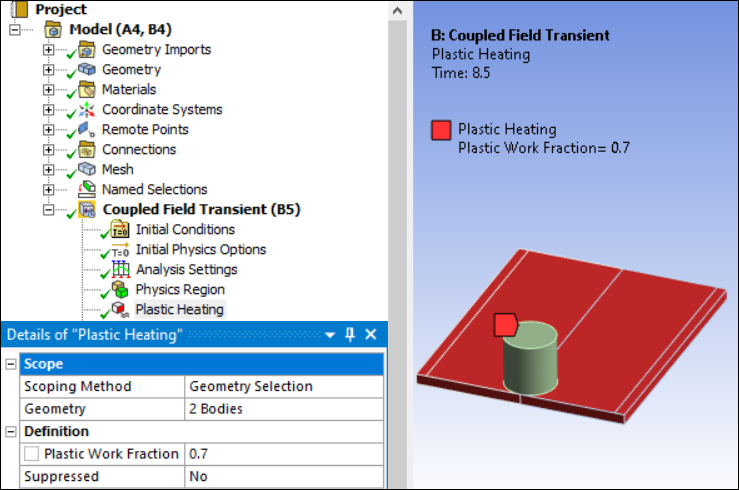Accurate temperature calculation is critical to the FSW process because the stresses and strains developed in the weld are temperature-dependent. Thermal properties of the 304L steel plates [1][3] such as thermal conductivity, specific heat, and density are temperature-dependent. Mechanical properties of the plates such as Young's modulus and the coefficient of thermal expansion are considered to be constant due to the limitations of data available in the literature.
It is assumed that the plastic deformation of the material uses the von Misses yield criterion, as well as the associated flow rule and the work-hardening rule [1]. Therefore, a bilinear isotropic hardening model (TB, BISO) is selected.
The following table shows the material properties of the workpiece.
Table 28.1: Workpiece Material Properties
| Material Properties of the Plates | ||||||
|---|---|---|---|---|---|---|
| Young’s modulus | 193 GPa | |||||
| Poisson’s ratio | 0.3 | |||||
| Coefficient of thermal expansion | 18.7 µm/m °C | |||||
| Bilinear Isotropic Hardening Constants (TB,BISO) | ||||||
| Yield stress[a] | 290 MPa | |||||
| Tangent modulus[a] | 2.8 GPa | |||||
| Temperature-Dependent Material Properties | ||||||
| Temperature (°C) | 0 | 200 | 400 | 600 | 800 | 1000 |
| Thermal Conductivity (W/m °C) | 16 | 19 | 21 | 24 | 29 | 30 |
| Specific Heat (J/Kg °C) | 500 | 540 | 560 | 590 | 600 | 610 |
| Density (Kg/m3) | 7894 | 7744 | 7631 | 7518 | 7406 | 7406 |
The fraction of the plastic work dissipated as heat during FSW is about 70 percent [2]. Therefore, the fraction of plastic work converted to heat (Taylor-Quinney coefficient or Plastic Work Fraction) is set to 0.7 (MP,QRATE) for the calculation of plastic heat generation in the workpiece material.
To weld a high-temperature material such as 304L stainless steel, a tool composed of hard material is required. A cylindrical PCBN tool is used since super-abrasive materials like PCBN are suitable for such processes [4]. The material properties of the PCBN tool listed in the table below are taken from references ([5][6]).
Table 28.2: Material Properties of the PCBN Tool
| Young modulus | 680 GPa |
| Poisson’s ratio | 0.22 |
| Thermal Conductivity | 100 W/m °C |
| Specific Heat | 750 J/Kg °C |
| Density | 4280 Kg/m3 |



